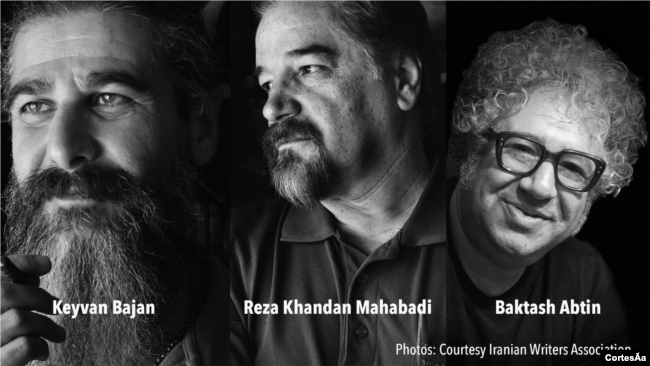VOA – “It was this black box and nobody talked about it,” Amir Soltani says of Evin Prison. When he was growing up in Tehran, Soltani’s school was directly behind the notorious Iranian prison where journalists, activists and political prisoners are held.
When several of his friends were imprisoned and later released, they returned with stories of humiliation, flogging, torture and mock executions. “It kind of shocked me as a child,” Soltani told VOA. “I never understood why Iranians or anybody would want to hurt another like that. And that prison defined my childhood.”

Soltani, author of Zahra’s Paradise, a graphic novel about the protests following Iran’s contested 2009 election, left Iran in 1980 after the Islamic Revolution. Now based in the U.S., he has dedicated his life to human rights activism.
“Those of us who have some degree of safety and security in the West, or at least in America, it falls on us to use our freedom in intelligent ways for others,” he said.
At least 15 in prison
In Iran, where domestic media are controlled by the state, journalists, writers and activists often face censorship, prosecution and imprisonment. At least 15 journalists were imprisoned in Iran at the end of last year, according to the most recent prison census data from the Committee to Protect Journalists.
Often journalists are charged with national security crimes, which has serious ramifications for press freedom, said Yeganeh Rezaian, a senior researcher for CPJ.
Rezaian has experienced firsthand the risks to Iranian media. In 2014, she was arrested alongside her husband, Washington Post journalist Jason Rezaian, and imprisoned in Evin for 72 days. Her husband was held for 544 days.
“Censorship has expanded beyond just arresting and imprisoning journalists; it has expanded so that journalists are censoring themselves to make sure they stay safe … and that is a very dangerous approach,” Yeganeh Rezaian told VOA. “The system has abused its power against journalism so deeply that now it starts from the very, very beginning and it is killing the freedom of expression from its very first step.”
The New York-based CPJ said four journalists have died in custody in Iran since 2003. One was executed and three died under suspicious circumstances or showed signs of beatings and torture.
Iran’s mission to the United Nations did not respond to VOA’s request for comment on Friday.
Journalists speak out
Despite the risks, writers and journalists continue to speak out. Members of the Iranian Writers Association are some of the most vocal.
The IWA was established in 1968 to support freedom of speech and oppose censorship. Iranian authorities banned it in 1981, and since then its members have been targeted with harassment, persecution and threats.
IWA members “are the guardians of the word, and they are the guardians of the creative impulses of a civilization, and they’re the face of its culture,” Soltani told VOA. “The country is awake and it’s alive and it’s vibrant and it has a voice. And that’s what these guys represent.”

PEN America this month awarded its 2021 Barbey Freedom to Write award to three members of the IWA who were jailed for speaking out.
Keyvan Bajan, a novelist and journalist, was sentenced to prison on national security and propaganda charges in 2019, along with filmmaker Baktash Abtin and literary critic Reza Khandan Mahabadi.
Their convictions relate to activities including circulating newsletters, compiling a book on the history of the writers association and attending memorial services for other members — activities that Iran’s authorities say are a national security threat.
“These three writers are emblematic,” said Karin Deutsch Karlekar, director of free expression at risk programs at PEN America. “All of these writers have been very involved in opposing censorship, upholding free expression rights and standing up for writers in Iran.
“They all knew that they would probably be pulled into prison because of this work and they’ve been very steadfast in standing up and continuing to push for these issues amidst a much worsening situation for human rights and free expression,” Karlekar told VOA.
Iran ranks 174th out of 180 countries, with 1 being the freest, on the 2021 World Press Freedom Index. Media watchdog Reporters Without Borders describes Iran as “one of the most oppressive countries” because of its persecution and harassment of journalists.
Abtin, Bajan and Khandan Mahabadi are all being held in Evin Prison, where poor conditions have been exacerbated by the pandemic. Abtin and Khandan Mahabadi contracted the coronavirus while there, according to PEN America.
Karlekar said that by spotlighting these writers, PEN hopes to improve conditions for the incarcerated. Better medical care, access to visits from relatives and lawyers, and an end to solitary confinement are all terms they advocate for.
“We want full exoneration and people to be let out of jail altogether, but I think even an improvement in prison conditions is something worth fighting for, and would help preserve their lives and save their lives,” Karlekar told VOA.
Soltani admitted that working toward press freedom and human rights in countries where oppression is severe can be challenging.
“The hardest thing for me as an activist, as a human being, actually, is realizing that the world will not change at my pace, at the speed at which I want it to change,” Soltani told VOA. “You have to understand that justice is something that flowers over the generations.”
 Shabtabnews In this dark night, I have lost my way – Arise from a corner, oh you the star of guidance.
Shabtabnews In this dark night, I have lost my way – Arise from a corner, oh you the star of guidance.



